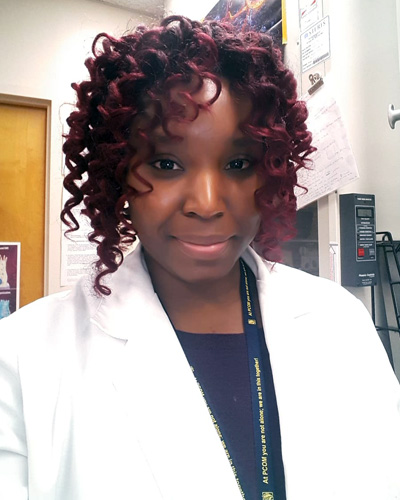Student Research Spotlight
Nnedi Osuji (MS/Biomed ’21)
January 21, 2021Nnedi Osuji (MS/Biomed ’21) completed her undergraduate degree at Temple University
where she received a bachelor of science degree in biology. Currently, Ms. Osuji is
in the second year of her Master of Science degree program and she has chosen a biomedical research concentration. In the first year of the master’s program, Ms. Osuji began working as a work study
research lab assistant in the cardiovascular development research lab of Dr. Cathy Hatcher who is an Associate Professor of Physiology. That experience encouraged Ms. Osuji
to pursue the second-year research concentration of the master’s degree program where
she focuses on cardiovascular research.
What are you studying?
Disruptions that occur during normal cardiovascular development lead to the formation
of congenital heart defects. Approximately 1% of all infants worldwide are born with
heart abnormalities and some of these defects will affect the coronary blood vessels
of the heart. I am investigating the expression of protein-coding gene transcripts
that may be altered in these infants that are born with heart abnormalities. Previously,
Dr. Hatcher’s lab identified the importance of the TBX5 transcription factor to heart
development in mammals. Her lab developed a transgenic mouse model with a Tbx5 deletion,
and the mouse exhibited signs of abnormal heart development including delayed formation
of the outermost layer of cells of the heart, or the epicardium, and impaired formation
of the coronary blood vessels that supply the cardiac muscle with much needed oxygen
and nutrients. Both of these cardiovascular structures are derived from a common progenitor,
the proepicardium, and Tbx5 is expressed here during cardiovascular development. A
closer examination of hearts from these Tbx5-deficient mice revealed reduced cardiac
expression of the gene encoding the adherents junction associated protein 1, or Ajap1.
Former students in the Hatcher lab discovered that silencing of the AJAP1 gene in
primary cultured human epithelial cells led to an increased adhesion of these cells
to underlying matrices and reduced their ability to migrate. In addition, expression
of several transcripts was, potentially, altered in these AJAP1-silenced cells that
were not altered in control cells. These types of cell behavior and changes in gene
expression are likely to affect how blood vessels are formed in the heart. The goal
of my research project is to dive deeper into this data in order to quantify and further
select gene transcripts whose expression appears to be altered. In addition, I am
conducting this project to validate and identify candidate transcripts in the TBX5-AJAP1
molecular pathway through a combination of in-person and virtual analyses.
What prompted you to pursue research?
When I started my work study job I knew both professors and students that were involved in research projects,
but I specifically wanted to join this lab and focus on congenital heart defects.
I am interested in cardiovascular medicine and children’s health. I knew this was
a research project that would be of interest to me, so I selected this area of research
for my second-year concentration.
Please provide a synopsis of your involvement and responsibilities in the research
project.
I am identifying transcripts that have novel interactions with AJAP1 in epithelial
cells that contribute to formation of the epicardial layer of the heart. First, I
will analyze and validate altered expression of these transcripts in response to silencing
of the AJAP1 gene. This is being conducted by quantitative polymerase chain reaction
(qPCR) analysis. Second, I will analyze the TBX5-AJAP1-induced molecular pathway of
candidate transcripts using a web-based prediction software. This software uses algorithms
publication databases to predict potential associations between sets of genes and
how those associations can impact cell behaviors. Third, I will work collaboratively
with other work study students in the Hatcher lab to quantify the amount of AJAP1
protein that is reduced following silencing of the AJAP1 gene in our primary cultures
of human epithelial cells. This will be carried out through western blot analysis
of AJAP1 protein expression.
What is the broader impact of your research?
Congenital heart defects (CHDs) are the most common type of birth defect worldwide.
These defects impact the lives of patients for the rest of their life and place them
at a higher risk for developing cardiovascular disease. The overall goal of our lab
is to develop a better understanding of why congenital heart defects occur, what can
be done to prevent them, and identify tailored approaches to treat those individuals
so they may have healthier outcomes.
Learn more about student research at PCOM.
About Philadelphia College of Osteopathic Medicine
Established in 1899, Philadelphia College of Osteopathic Medicine (PCOM) has trained
thousands of highly competent, caring physicians, health practitioners and behavioral
scientists who practice a “whole person” approach to care—treating people, not just
symptoms. PCOM, a private, not-for-profit accredited institution of higher education,
operates three campuses (PCOM, PCOM Georgia and PCOM South Georgia) and offers doctoral degrees in clinical psychology, educational psychology, osteopathic
medicine, pharmacy, physical therapy, and school psychology. The college also offers
graduate degrees in applied behavior analysis, applied positive psychology, biomedical
sciences, forensic medicine, medical laboratory science, mental health counseling,
physician assistant studies, and school psychology. PCOM students learn the importance
of health promotion, research, education and service to the community. Through its
community-based Healthcare Centers, PCOM provides care to medically underserved populations.
For more information, visit pcom.edu or call 215-871-6100.
Contact Us
For general media inquiries, please contact the Office of Marketing and Communications
at 215-871-6300 or communications@pcom.edu. Visit our media relations page to view contact information for public relations personnel.
Connect with PCOM

 Nnedi Osuji (MS/Biomed ’21) completed her undergraduate degree at Temple University
where she received a bachelor of science degree in biology. Currently, Ms. Osuji is
in the second year of her
Nnedi Osuji (MS/Biomed ’21) completed her undergraduate degree at Temple University
where she received a bachelor of science degree in biology. Currently, Ms. Osuji is
in the second year of her 